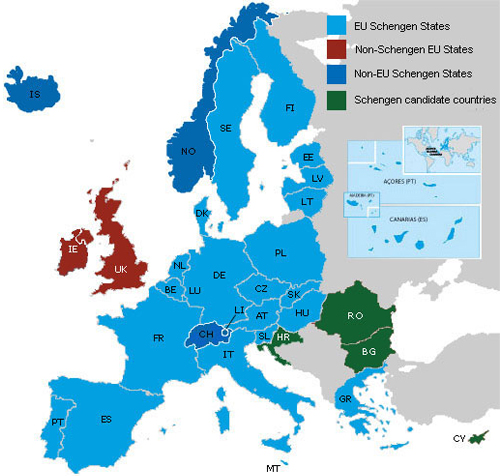
Schengen area. Source: European Commission
The European Commission said Georgia has fulfilled all the benchmarks of its visa liberalisation action plan and it will propose in “early 2016” to the EU-member states to allow visa-free travel to the Schengen area for Georgian citizens.
After the European Commission puts forth a legislative proposal on visa waiver, it should then be approved by the European Parliament and the EU-member states before it can go into force. Georgia hopes the process will be completed by mid-2016.
“The Commission considers that Georgia meets all the benchmarks set in respect of the four blocks of the second phase of the VLAP,” reads the European Commission’s fourth and final progress report on how Georgia has implemented its Visa Liberalisation Action Plan, released on December 18.
Visa Liberalisation Action Plan (VLAP), which was presented by the EU to Georgia in February 2013, is a set of detailed requirements that the country had to meet in order to become eligible for visa-free regime with the Schengen area.
After approval from the European Parliament and the EU-member states, Georgian citizens, holding biometric passports, will be able to enter the Schengen area without visa more than one time during 90 days in any 180-day period.
According to the Justice Ministry’s Public Service Development Agency up to 776,000 Georgian citizens hold biometric passports as of December 18, 2015.
"I am very pleased that Georgian citizens with a biometric passport will soon be able to travel to the Schengen area for short stays without a visa," EU Commissioner for Migration, Home Affairs and Citizenship, Dimitris Avramopoulos said on December 18.
"The hard work of the Georgian authorities over the past three years towards achieving this important goal for the benefit of Georgian citizens has given positive results. Now it is important to keep upholding all standards," he added.
#Georgia Georgia meets criteria for visa liberalisation https://t.co/FHnim9A9Rp pic.twitter.com/PURdkZGe7M
— EU External Action (@eu_eeas) December 18, 2015
The visa-free regime will apply to travels to all EU-member states, except for the United Kingdom and Ireland.
The visa exemption will apply the following EU-members, which are part of the Schengen area: Portugal, Spain, France, Germany, Belgium, Luxembourg, Netherlands, Italy, Denmark, Sweden, Finland, Austria, Greece, Poland, Slovakia, Slovenia, Hungary, the Czech Republic, Latvia, Lithuania, Estonia and Malta.
It will also apply to those EU-member states, which are not yet part of the Schengen zone: Cyprus, Croatia, Romania and Bulgaria, as well as to following non-EU member states: Iceland, Liechtenstein, Norway and Switzerland.
The European Commission said that since its previous report on implementation of the VLAP in May 2015, Georgia has made the necessary progress and “the legislative and policy framework, the institutional and organisational principles, and the implementation of procedures throughout the four blocks comply with European and international standards.”
Those four blocks in VLAP involved reform targets in areas ranging from document security, border and migration management to public order, external relations and fundamental rights.
The European Commission also said that it will “continue actively to monitor Georgia’s continuous implementation of all benchmarks under the four blocks of the VLAP through the existing association structures and dialogues, and, if necessary, through ad hoc follow-up mechanisms.”
Also on December 18, the European Commission released sixth report on Ukraine’s visa liberalisation, which, like in respect of Georgia, also says that it will present in early 2016 legislative proposal to grant visa-free regime to Ukraine; it will also require approval of the EU member states and the European Parliament.
“The progress achieved by Georgia over the last three years in all areas covered by the [visa liberalisation] action plan was steady and effective. It demonstrated that commitment and constant efforts of the Georgian government, all state institutions, as well as the overwhelming majority of the political forces and civil society. I think this has made fulfillment of the visa liberalisation benchmarks a true national priority in Georgia,” EU ambassador to Georgia Janos Herman said in Tbilisi.
“This is a great performance that has led to a great success and this great success will definitely benefit the Georgian people,” he added.
The EU ambassador said that this process of implementing visa liberalisation benchmarks proved to be “an important and particularly effective tool for advancing far-reaching difficult reforms in the justice and home affairs area and beyond.”
“It has proved to be a major impetus to the implementation of our Association Agreement. Georgia has allocated appropriate resources and we are sure that this will provide guarantees that the reforms implemented in relation to the visa liberalisation process are sustainable,” Janos Herman said. “Today we have genuine reasons to celebrate.”
Asked how much time it may take for the EU member states and the European Parliament to give final approval to lifting of the visa rules for the Georgian citizens, the EU ambassador brought an example of Moldova.
In the case of Moldova, interval between the European Commission’s positive final report and the time, when visa-free travel rule came into effect in late April 2014, was five months.
“That is a period that might serve as an orientation for judging necessary time, but of course it is not entirely safe orientation, because there might be significant difference between the countries,” Herman said.
He also stressed during the press conference in Tbilisi that the European Commission’s report does not mean that visa-free regime is already a done deal.
“There is absolutely no space for sort of complacency – to think that we’ve done it,” the EU ambassador said. “Some people might say that the ball is now in EU’s court – I am sorry to say that there are several balls in this game, not just one; so there is no reason to think that we’ve already done it. There is a phase ahead of us and that’s as important as the one behind.”
This post is also available in: ქართული (Georgian) Русский (Russian)
